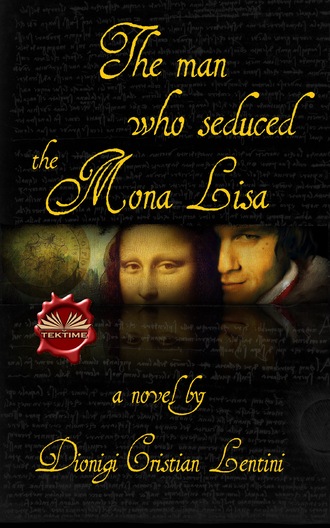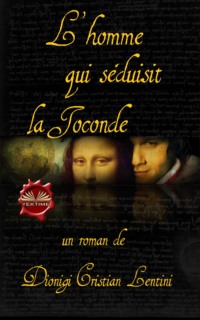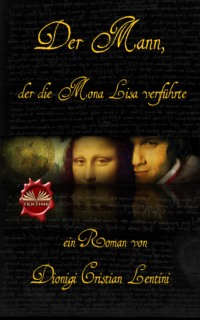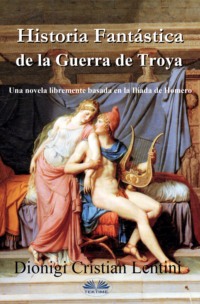
Полная версия
The Man Who Seduced The Mona Lisa
The news of the naval victory and even more so of the fearful escape of the barbarian chief raised the morale of the Neapolitans and their allies… Duke Alfonso managed to reorganize a discreet army of mercenaries finally also supported operationally by the other Catholic nobles, who then perceived the possibility of winning back Otranto and Puglia. Spain sent 20 ships and Hungary 500 choice soldiers.
It was one of the most impressive naval sieges recalled by history: the colossal siege of Otranto.”
Meanwhile the horses were starting to become tired and needed clean water. Tristano then looked around and suspended his epic narrative.
Pietro was, as always, bewitched and dumbfounded, pensive, in the same way as children who have heard the Homeric or Virgilian poems told for the first time.
“And then? What happened? How did it end, sir?”
“Well, the rest is fairly recent: after the death of Muhammad II, the new sultan actually forbade Ahmet Pascià from returning to Italy. At the end of last summer, exhausted by hunger, thirst and the plague, the Ottomans surrendered and the Aragonese finally regained control of the city. According to some, the infamous Turkish leader is in prison or was even executed by his own men at Edirne. “O quam cito transit gloria mundi”, concluded Tristano.
“What, Excellence?”
“Nothing Pietro, nothing. Let's hurry up now. The generous and abundant breasts of the Parthenope siren await us… “
And spurring his steed forward, he quickened his pace, dragging an even more confused Pietro behind him.
VII
Don Ferrante and the reason for Naples
The ambush and the maidAfter a couple of days they came to a sunny and busy capital, in the midst of a colorful market, anything could make one leap to the wildest fantasy: from fruit to furniture, from fish to hemp ropes, from music to sculptures, from sweets to livestock, from relics to prostitutes.
“Anyone who goes on a trip to Naples must prepare to get to know at least three divinities: pasta, mozza and struffoli”, said Tristano amusedly to his companion.
“I hope I get to know them all soon, sir”, replied Pietro.
They left the horses in a small, narrow stable and proceeded on foot through the lanes and alleys that divided the confusing exhibition district.
Soon, however, the two strangers realized they were being followed. So they tried to blend into the crowd, between the tents of the stalls, making their way through the intrusive merchants, but that ugly face seemed to know that environment better than anyone else and he certainly had no problem in maintaining his sinister close stalking. Pietro then decided to face him; he signaled to Tristano to turn through a narrow secondary alley and, as soon as the man emerged from the corner, he pulled his sword out to the side, trying to dissuade the pursuer.
To these were added immediately two others, moreover well equipped.
Threatening mockingly, they began to approach, lowering and coiling like loins on their prey. After a circling around, the scuffle began: the one with the dark feathered cap parried Pietro’s double attack, from right and from above, suddenly slashing at the height of his waist making the latter leap backwards. The other, wearing a more lively doublet, had a showy octagonal pomolo, a wide-bladed sword set with precious lapis lazuli; turned and raised his sword to heaven, inviting Tristano to do the same; he then charged the blow on the cinquedea, a short-bladed sword of the young pontiff, promptly blocked the blow, countering with the long iron and with a kick to the opponent's thigh. Meanwhile, the third, with the striped codpiece, pulled out a rapier and rushed to assist the first, alternating with this against the Bolognese swordsman; he sliced down the length of a man’s body, which was blocked by Di Giovanni who raised his arm and turned his sword upside down; then he scored a wide arc in the air and responded to the blow, forcing the opponent to change guard.
As the air heated with the sparks from the blades and the clashing of the blows on the helmets, they unwittingly went into the semi-dark alleys of the old city.
Pietro then made a wise backtrack and a small step forward accompanied by a threatening lunge; then after another hesitation he launched into the attack: he drew his sword very quickly from the bottom upwards and with a masterful twist of his wrist he sliced from right to left forcing the thug to open his arm leaving his body exposed; then he locked the blade with the buckler, and relentlessly struck the weapon in his chest.
On the other front, Tristano was in serious difficulty, as he struggled with a well-trained opponent, he quickly advanced with his left knee, hit to the right and vice versa, to simulate circling with his body, to enable a change in rhythm and guard, he sought any hesitation in the wavering defense of the diplomat. Pietro tried for a moment to help him and would have been able to if he hadn't had a hard bone to pick.
Suddenly from overhead, two huge white sheets that had been patched and weighted on the sides fell over the heads of the two Neapolitans, who became temporarily entangled. A whistle from a street urchin providentially showed Tristano and his assistant an escape route, and when the thugs were able to resume their pursuit, a door into a hypogean cellar had already swallowed up the two strangers, keeping them safe for a while.
Having escaped the danger, the latter were finally able to return to the alley that in the meantime had revived with a few poor folk, but they were unable to see or thank those little street urchins to whom they probably owed their lives; incredibly they had disappeared, as had the good Pietro's money bag!
In short, after spontaneous and dutiful curses, the two had a great laugh and in mid afternoon they reached Castel Nuovo.
There the elderly sovereign immediately welcomed them with finest tributes and considerations who, although at odds with the Pope, retained a particular sense of gratitude towards Tristano and a respect that went beyond their respective public roles: he probably saw in him his friend Latino.
Indeed, it was Cardinal Orsini, then apostolic legated a latere, who, bearing the bull of investiture granted by Pope Pius II and assisted by Cardinal Trevisan, by the archbishop of Nazareth in Barletta, Giacomo de Aurilia, by the archbishop of Taranto and by other numerous prelates, on February 4 AD 1459, during a sumptuous ceremony in the square in front of the castle of Barletta, crowned Ferdinando I of Naples blessing him with the triple title of king of Sicily, Jerusalem and Hungary. Latino had noted the episode and the events of the following days of the coronation on that diary page that had been strangely torn and had disappeared mysteriously from the cardinal's personal archive.
Don Ferrante and Don Tristano were closed in conclave for over two hours.
Before their departure, the pontifical official personally took care of removing the main diplomatic obstruction hindering any relationship between the Holy See and the Neapolitan court: he ensured that the royal secretariat became aware of a few secret missives, obviously false, that the Venetian ambassador to Naples had sent to his doge. In such dispatches the Neapolitan ruler was described as inept, vain, and a libertine. The reaction was immediate.
Thanks to the consequent repatriation of the man from Serenissima and the king's personal esteem, the interview was extremely cordial and, in the end, although Don Ferrante had not come to any decision, it seemed to Tristano that the sovereign was well disposed to considering the reasons set out and to analyze the scenario that had been proposed to him.
And in fact, he was right: two days later he recalled the young pupil of the defunct Cardinal Orsini and verbally informed him that the Kingdom of Naples would take part in the new alliance against Venice. The command would be entrusted to his son Alfonso, the Duke of Calabria, who would also take on the role of captain of the league. The agreement was later formalized and made official on Christmas day.
Tristano was extremely satisfied.
After a rich dinner based on Christmas pastries and sweets, certainly not disdained by the barons and the most courteous representatives of the Neapolitan nobility, the young man decided to retire to his apartment perhaps to try to relax by soaking in a warm tub the His Majesty had generously requested to be prepared.
The elderly woman, who had so thoughtfully set up the bathroom for him, while arranging the last linens in a closet, stared at him persistently. But the numb official paid no mind to her, as he was immersed in his thoughts and unsolved questions at least as far as he was in that steaming tub.
“You have the same eyes. Your mother was a saintly woman,” said the woman before disappearing behind the door of the room.
The one who had been caught dreaming spun around. Those words brought him back to reality like the tone of a bell.
“ Wait,” he shouted in vain.
How did that maidservant known his mother? Had she had the chance to meet her or work with her during the period when the young woman had served at that court? Tristano had to know… He leaped out of the tub and, dried himself as best he could, quickly he put on his shirt, breeches, and boots and rushed to look for her in the palace.
When he reached the service floor, he heard unmistakable human moans, separated by more high pitched grunts mixed with regular squeaks from wooden planks, coming from the room at the bottom of the staircase.
The pastry chef, the sublime architect of those gluttonous sugar architectures that reigned over the tables of the palace banquets, as well as the almond desserts, was as usual filling the young eager servants who tidied up the kitchen at the end of the day. At that moment, however, the young ambassador did not have time for that type of display and casting a fleeting glance, he passed on determinedly.
Beyond the kitchens, in a narrow corridor, he glimpsed a good half of the corpulent profile of a woman, lying on the floor, supine, from the wide-open door of the room, the light from the fireplace lit her face, as if someone had tried to carry the body after felling it. It was the long-sought woman Tristano had been searching for.
Rushing in, the servant was wide-eyed her mouth half-open, she no longer breathed. On the floor of the room he noticed a small deep blue stone, probably part of a lapis lazuli gem similar to those set into the handle of the pursuer's weapon of a few days before.
However, he was warned by the noises coming from the entrance hall and decided to leave before someone noticed his presence, which was hardly justifiable, in that inconvenient place.
The next morning, together with his assistant, he left the castle. In the shadow of a tower, Pietro recognized, among the Duke of Calabria’s henchmen, one of the men who had made the attempt on their safety the day they had arrived and whispering he informed his lord. The latter, however, given the diplomatic result achieved and the still murky situation, decided not to say a word and moved away among the salutations.
Конец ознакомительного фрагмента.
Текст предоставлен ООО «ЛитРес».
Прочитайте эту книгу целиком, купив полную легальную версию на ЛитРес.
Безопасно оплатить книгу можно банковской картой Visa, MasterCard, Maestro, со счета мобильного телефона, с платежного терминала, в салоне МТС или Связной, через PayPal, WebMoney, Яндекс.Деньги, QIWI Кошелек, бонусными картами или другим удобным Вам способом.







